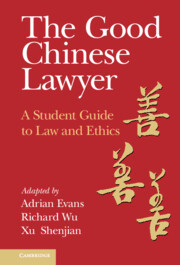Book contents
- The Good Chinese Lawyer
- The Good Chinese Lawyer
- Copyright page
- Dedication
- Contents
- Figures
- Tables
- Preface
- Acknowledgements
- 1 Good Legal Education
- 2 The Law Practice Landscape of Greater China
- 3 Values, Ethics and Virtue in Lawyering
- 4 Connecting Character to Lawyers’ Roles
- 5 Truth and Deception
- 6 Professional Secrets
- 7 Conflicts of Loyalty and Interest
- 8 The Morality of Competence
- 9 Practical Wisdom for Lawyers
- Appendix Safety Nets for Lawyers
- Index
1 - Good Legal Education
Published online by Cambridge University Press: 24 March 2023
- The Good Chinese Lawyer
- The Good Chinese Lawyer
- Copyright page
- Dedication
- Contents
- Figures
- Tables
- Preface
- Acknowledgements
- 1 Good Legal Education
- 2 The Law Practice Landscape of Greater China
- 3 Values, Ethics and Virtue in Lawyering
- 4 Connecting Character to Lawyers’ Roles
- 5 Truth and Deception
- 6 Professional Secrets
- 7 Conflicts of Loyalty and Interest
- 8 The Morality of Competence
- 9 Practical Wisdom for Lawyers
- Appendix Safety Nets for Lawyers
- Index
Summary
There are several types of law degrees in Greater China but no simple way to compare them or work out whether a single law school will provide you with a good (moral) legal education. We explain what makes a law school morally good and what questions to ask your preferred law school. We discuss how to manage your mental health as a law student and lawyer, and how this is connected to Confucius’ teaching about the ‘superior man understanding what is right’. We discuss Davd Luban’s insight that lawyers’ careful moral thinking is critical to the future of law and legal practice. Because professional conduct rules can only rarely be applied without reference to context and circumstances, there will always be a need for lawyers to use an underlying moral framework or methodology, when they encounter new or challenging decisions. Four global approaches to ethical decision-making are introduced – consequentialism (similar to utilitarianism), Kantian ethics, virtue ethics and Confucian teaching. At the heart of each of these approaches is a commitment to integrity and, in those circumstances when it is required, to open candour and frankness, irrespective of self-interest or embarrassment.
Keywords
- Type
- Chapter
- Information
- The Good Chinese LawyerA Student Guide to Law and Ethics, pp. 1 - 24Publisher: Cambridge University PressPrint publication year: 2023

